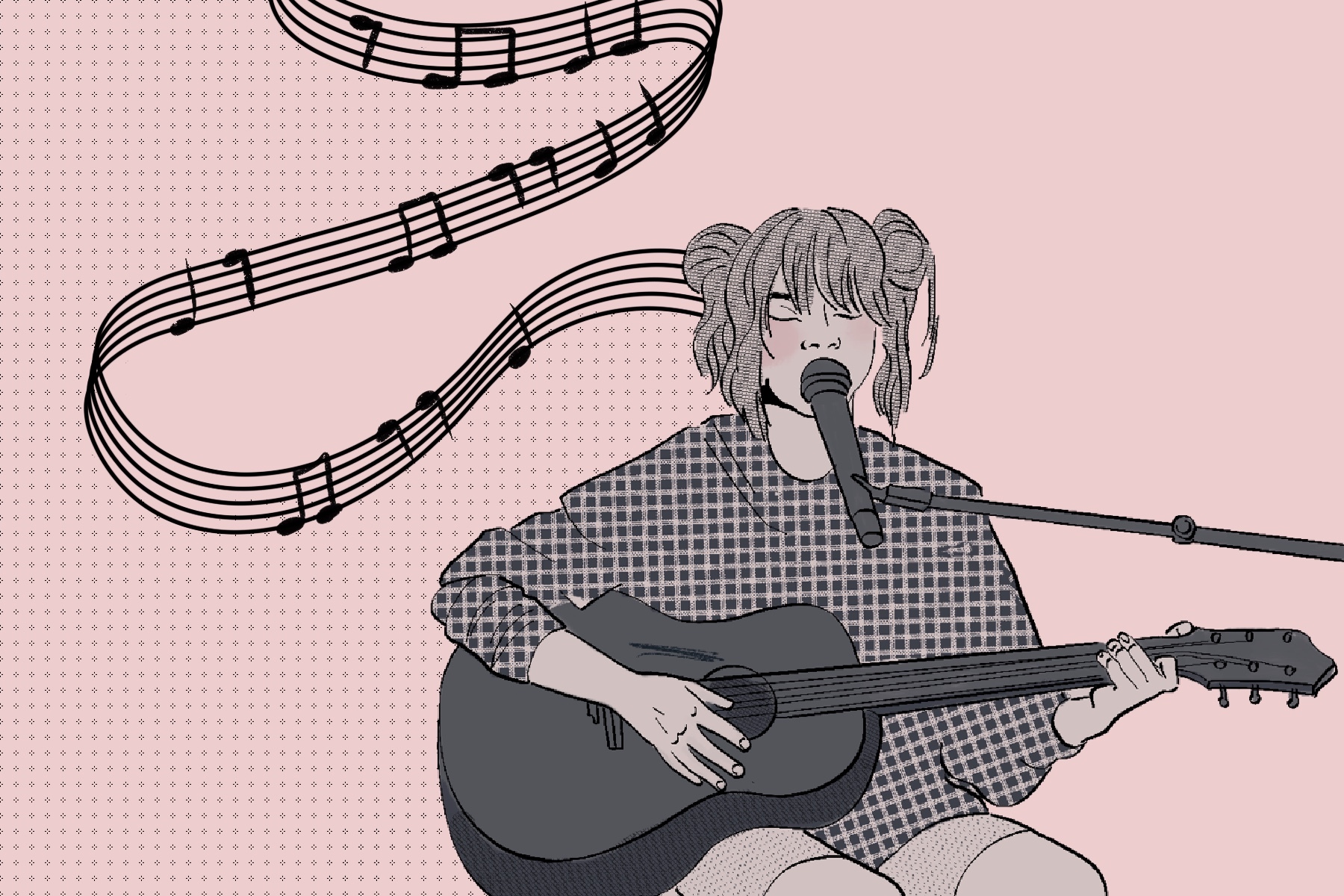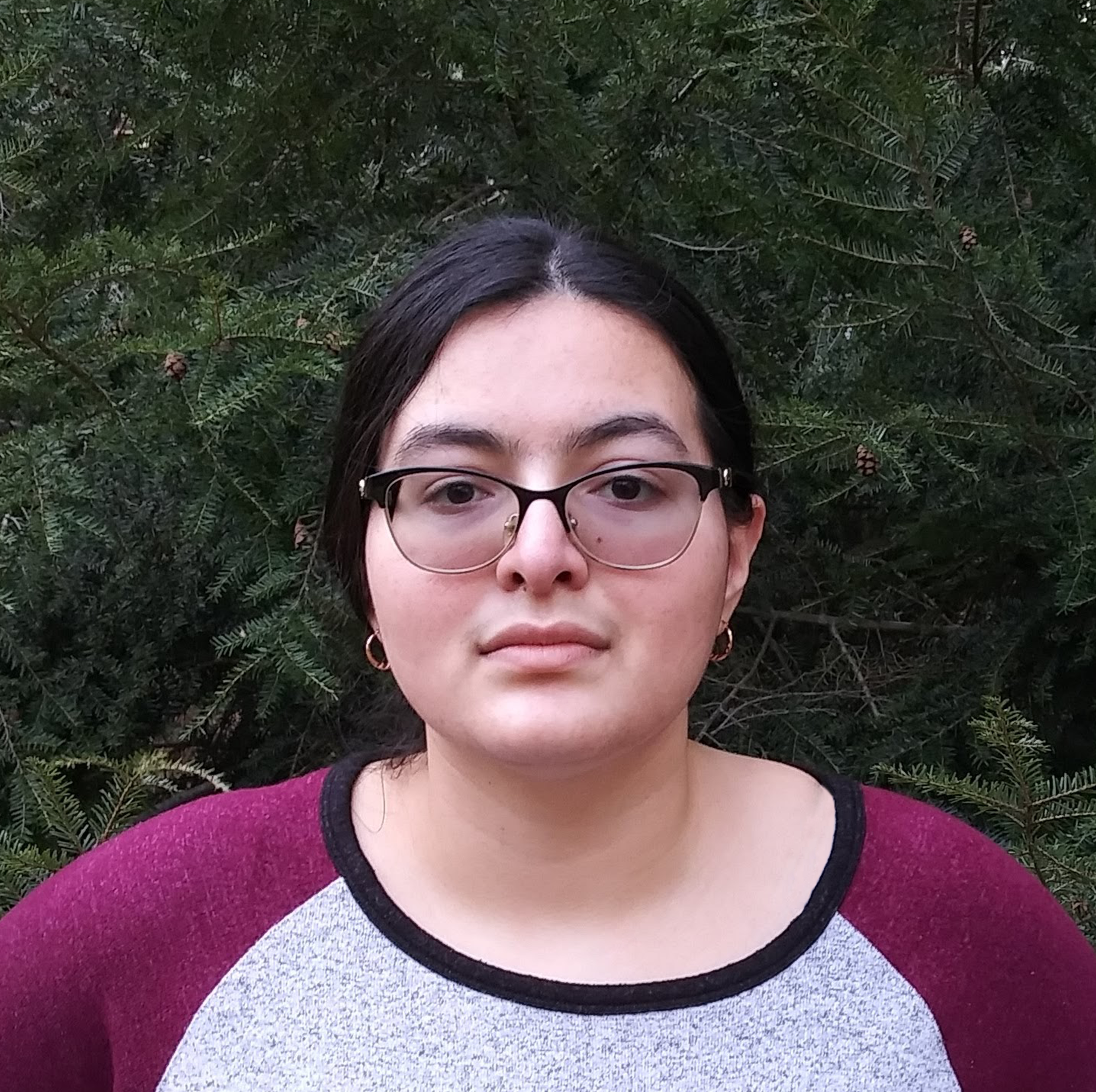So far, 2022 has been a stressful, surreal year. Don’t take my word for it, though — listen to Billie Eilish‘s two new singles, appropriately bundled under the name “Guitar Songs.” She released them with little notice, a fittingly understated surprise for a dread-filled world. The songs have a sorrowful atmosphere that surrounds the listener in the same muted tones as the album cover, all dull grays behind a blur of faded pinks.
In “Guitar Songs,” Eilish’s voice floats over the guitar chords, her most stripped-down music yet. It’s both signature Billie Eilish and something new altogether. Sometimes her vocal cords reveal a rough edge more present on her earlier albums, but mostly her voice is as soft as a sigh. She’s abandoned the danceable intrigue and heavy bass of her award-winning “When We All Fall Asleep, Where Do We Go?” Even her subdued follow-up album, “Happier Than Ever,” had more playfulness and backing music than the simple guitar. However, none of this suggests that “Guitar Songs” is lacking. Eilish’s latest direction feels careful, personal and thoughtful.
Together, the subdued tracks on “Guitar Songs” feel like two halves of a whole. The first song, “TV,” functions as a reaction to the surrounding world, both personal and national. The second, “The 30th,” meditates entirely on a single incident. Despite (or perhaps because of) their different scopes, both deliver an incredible sense of catharsis.
In “TV,” Eilish lethargically strings together a series of events and feelings, connecting to both a relationship and world events. She paints pictures with pop culture, like putting “on Survivor just to watch somebody suffer” and then “sinking in the sofa while they all betray each other.” The cultural touchstone creates a visceral contrast — the hot sand and backstabbing, the soft cushions and breakdown. You can feel yourself sinking into her words the way she settles into the sofa, despondent and unable to get up.
With a slow discomfort, Eilish sings troubled lines about a relationship. Either in or out of character, the singer feels tempted to starve herself “just because you’re mad at me” and abandons her friends because “That’s what happens when you fall in love.” She sounds sorrowful and doubtful, trying to convince herself it’s okay. The sentiment is relatable to her Gen Z peers. Friends leave as soon as they’re caught up in a high-maintenance relationship. But other ideas, like starving and drowning, showcase an unhealthy relationship with body image and self-harm.
Real-world events lend atmosphere to her music just as much. Appropriately for a song titled “TV,” she leans into the spectacle of cable news. Her push for the song’s quick release allows her to discuss issues relevant today instead of months ago. With the pair of lines “The internet’s gone wild watching movie stars on trial / While they’re overturning Roe v. Wade,” she languidly illustrates the tendency to pick spectacle over substance. A vulturous following defined Depp v. Heard, the infamous celebrity trial. It’s an interesting choice not to name the case in her lyrics, one that subtly refocuses attention on the more significant overturning of Roe v. Wade.
Both the trial and the overturning of Roe v. Wade have dire implications for the women caught in the crosshairs, one ushering in the demise of #MeToo and the other signifying the death of abortion rights. Yet pop culture gives the former more attention while reducing the trial to a narrative that degraded Amber Heard (and her supporters) and worshipped Johnny Depp. You’d be forgiven for thinking Depp had just been nominated for sainthood. It reminds me of how the draft opinion of Roe v. Wade leaked during the 2022 Met Gala. What could be more dystopian, more “Hunger Games,” more perfectly contrived than that? A literal gala and the decay of society. Depending on what news I looked at, fancy dresses might get more attention than the loss of human rights. Eilish deftly captures the despair I felt at the contrast.
On “The 30th,” the outside world doesn’t seep in. A friend’s car crash anchors the song while the speaker’s gut-wrenching internal whirlwind of emotions engulfs the lyrics. Some of her words dance around an ugly reality, like when she says, “I told you even then you looked so pretty.” Others take a distanced look at the crash itself, from the moment “when I saw the ambulances on the shoulder.” Her first two verses parallel each other. After waking up in the ambulance, her friend can’t remember the crash but “pieced it all together on the drive.” After witnessing the accident from afar, the speaker “pieced it all together late that night.” Eilish deals with the accident from across distances, be it the road, time or location. As a result, she spends most of the song without coming close to confronting the horrific reality.
When she finally does, her lyrics spiral, racing like her thoughts. Each “what if?” is louder, harsher and shriller, as she desperately confronts how close she was to losing her friend. Each line ends without resolution, balancing on a never-ending edge. She sounds like she must either run out of breath or shatter into a thousand pieces. But she can’t outright voice her fears until she asks, “If you changed anything, would you not have survived?” Throughout the song, she repeats, “You were scared / and so was I,” but her last line changes this to “so am I.” She hasn’t surmounted her fears, an admission she leaves hanging with only a single guitar chord to temper it.
Baked in despair, the two tracks on “Guitar Songs” should be thoroughly depressing, but that’s not the case. Both songs offer strength through their bittersweet yet empowering resolution. In both cases, they deliver spine-chilling rallying cries near the end, reacting to their despair with pulsing vitality.
The outro of “TV” is the longest part of the song and the quietest at first. After saying, “And I don’t get along with anyone,” she starts slowly, repeatedly singing, “Maybe I’m the problem.” At first, it seems pointless, a tortured and misdirected exercise. She is not the problem; she’s just one person. None of us, alone, is the problem. The problem lies with the politicians, the people who ruined the world, not the youth like Eilish, who inherited it. But then the audience (from her first performance of the song in Manchester) starts chanting along, and it transforms into something empowering. Shouting along to “Maybe I’m the problem” suddenly feels like an acceptance of our flaws and our hypocritical tendencies. More importantly, the group rallying cry moves us past our helplessness and toward the idea that we can do something about it.
In “The 30th,” the outro feels much more personal. Spiraling through audibly all-consuming “what ifs,” the list of ways the accident could have been worse threatens to overwhelm. But then, the breath sucked out of both singer and listener, she breaks free. The line “you’re alive, you’re alive, you’re alive” — a perfect trifecta — cuts through the listener vividly. She can’t hold the last “alive” at the same tense pitch, instead allowing it to falter and fade. The whole sequence sends chills down my spine.
To quote from Eilish’s lyrics, “TV” is the song that feels like the listener will “stay in the pool and drown” with its slow, sad lyrics. By contrast, “The 30th” serves as a much-needed gasp of fresh air after resurfacing at the end of “Guitar Songs.” The duality between and within both songs creates a thoroughly enjoyable and atmospheric listening experience.
For many, 2022 has been a tough year, making “Guitar Songs” relatable. Eilish’s latest singles reflect this year’s lethargy, tragedy and distressing personal and world events. Recent events seem to weigh as heavily on her as they do on us, humanizing her more than her recent albums. If this is the path she continues to follow with her new music, I can only imagine how much the somber singer will grow.

















